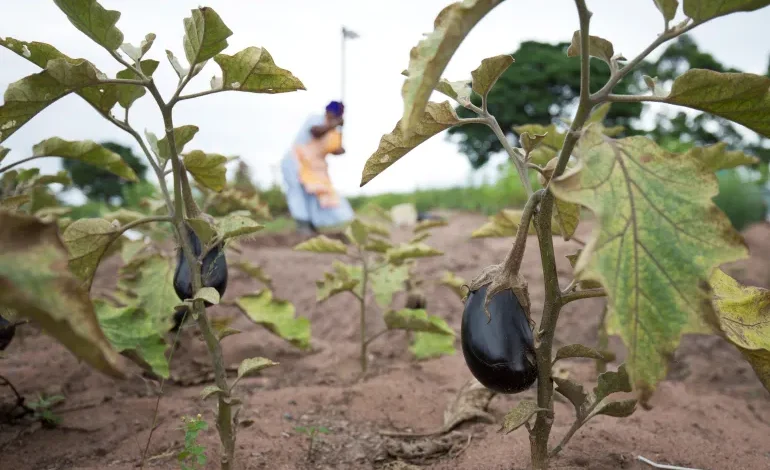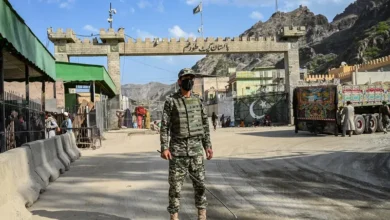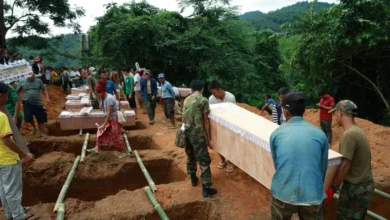‘Forgotten citizens’: South Africa’s farm workers threatened with eviction

Three generations of Mini Myeza’s family have lived on Oakville pine tree farm in South Africa’s KwaZulu-Natal province. Now the 58-year-old widow may be evicted from the land where she was born.
“My family has lived here on this farm for generations, long before the farm was built,” Myeza told Al Jazeera on the plantation in New Hanover, about 40km from the city of Pietermaritzburg.
She relayed the story her late father told her: under apartheid rule, the ancestral lands belonging to their family and a neighbouring Black family were seized by white farmers and combined to create the 269-hectare (665-acre) pine plantation farm.
Those living on the land remained, but all the Black men were forced to work on the farm for poverty wages and often no pay at all. No one was compensated for the land that was seized.
“Those of us who live on the farms don’t know the meaning of freedom and human rights because our rights are violated on a regular basis,” Myeza lamented.
“That is why we are known as South Africa’s forgotten citizens.”
The graves of her family members – including her great-grandfather, grandfather, father, husband and two of her four children – are not far from her homestead.
Most of them, including Myeza’s husband James, lived their whole lives not seeing any gains from their years of hard labour. James died in December 2018 at age 60 – after working for more than 30 years on the farm.
“After he died, I didn’t get even a penny from the farm,” Myeza said, about how her predicament worsened. The farm owners who had bought the plot from other farmers told her they “didn’t have the records that [James] had worked here for so long”, and refused to compensate her for her husband’s decades of service.
“I was still mourning, wearing my black clothes when I was told by the farm manager that I should move out with my kids and find elsewhere to live because there is no one from this home who works on the farm,” she said.
The plight of farm workers
Myeza’s is a plight familiar to many labourers and low-income farming families across South Africa.
The country’s total land area is about 122.3 million hectares (302 million acres), of which 100.6 million hectares is farmland. Of this, 83 percent is grazing land with 16.7 million hectares considered potential arable land, according to the Development Bank of Southern Africa.
Decades since apartheid rule ended, white South Africans who make up about 7.3 percent of the population still own most of the country’s farmland.
The African National Congress (ANC), which has governed the country for the last 30 years and could lose its majority in parliament for the first time ever as votes to Wednesday’s election are counted, promised to redistribute 30 percent of agricultural land to Black South Africans. Analysts say it is on track, having reallocated 25 percent.
Opposition parties have vastly different takes on the issue. The official opposition Democratic Alliance agrees with reallocating state-owned land; the far left Economic Freedom Fighters champions expropriating land without compensation; and the right-wing Freedom Front Plus says expropriation will damage the economy.
Meanwhile, even the percentage of farmland that the government has redistributed to Black South Africans has not helped the majority of workers who continue to face many of the same challenges they always have.
Human rights organisations assisting poor farm dwellers and labourers say the shabby treatment and harassment they face remains part of the ugly underbelly of the agricultural industry – the fifth largest contributor to the country’s economy, after mining, transport, energy, manufacturing and tourism.
Aid organisations have stepped in to help farm workers fight for their right to remain on farms, ward off abuse from farmers, and even arrange payment for lawyers to bring their plight to the attention of the courts or relevant authorities.
In Pietermaritzburg, the Association for Rural Advancement (AFRA) is one such organisation that is helping farm dwellers like Myeza.
Though politics and freedoms for Black people have changed since apartheid, living and working conditions for farm labourers and dwellers have not changed much, he said, adding that many issues remain so the organisation continues to help promote the rights of marginalised communities throughout KZN.
“Our role has evolved over the years to the current land rights advocacy organisation in current times. But one thing [that] remains constant is that the slow pace of the government’s land reform programme has perpetuated an unequal society,” Sithole said.
“Farm dwellers and farm labourers remain the most impacted as they remain occupiers on land owned by somebody else.
“The resultant skewed power relations and subservient relationships between farm owners and farm dwellers translates to the persisting proverbial breeding ground for rights violations.”
He added that this is despite the enactment of laws such as the 1996 Labour Tenants Act and the 1997 Extension of Security of Tenure Act (ESTA) – which regulate the relationship between landowners and landless occupiers and provide rights protecting people from unfair eviction.
“What we have observed is that the abuse and diminishing of rights of farm dwellers continues at the hands of some landowners,” said Sithole. He added that AFRA has in turn helped farm dweller communities to form or work with structures that represent their interests and help protect their rights.
The hardships
Working and living conditions on farms came into sharp focus during the August 2012 to January 2013 Farm Workers’ Strike – a wave of protests by agricultural workers in the Western Cape spurred by high unemployment and low worker pay – in which three workers died and millions of rand in property damage was sustained.
The strikes resulted in a sharp increase in the daily minimum wage for agricultural workers from 69 rand (roughly US$8.54 in 2012) to 105 rand (US$13 in 2012). Today, the national minimum wage, including for farmworkers, is 27.58 rand per hour.
Although there have been some small improvements, in November 2020, the Parliamentary Monitoring Group (PMG), a watchdog, issued a report that decried conditions for farm dwellers in post-apartheid South Africa. In its preamble, the report stated, among other things, that “despite plethora of legislative and policy formulations and interventions, farm dwellers as part of the vulnerable people in South Africa, continue to encounter a number of challenges including tenure insecurity, threatened livelihoods, and violation of their human and labour rights”.










